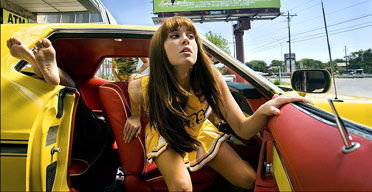You'd never guess from his foul mouth, King Kong body language and ultraviolent films, but Quentin Tarantino is not a man's man. He was raised by his mother in a single-parent household, which perhaps explains why his female assistant, producer and publicists are the people he trusts most when it comes to making decisions. This side of Tarantino's psyche will be exposed to the world on May 22, when his new film Death Proof, formerly one half of the conceptual two-in-one double bill Grindhouse, makes its full-length debut in Cannes. But anyone expecting a slaughter marathon will be bemused.
Though Grindhouse was conceived as a tribute to the scuzzy, gory, topless, anything-goes B-movies of the 70s, with his friend Robert Rodriguez supplying the opening zombie romp Planet Terror, Tarantino's homage to the slasher-movie genre is simply that: a nod to some of the conventions, not a full-blown recreation.
When Grindhouse debuted to largely positive reviews in the US last month, Death Proof received rave notices even in its severely truncated form. Chopped to 90 minutes, it starred Kurt Russell as Stuntman Mike, a washed-up stand-in who stalks young girls in his car and stages fatal collisions for his own sexual gratification. Put that way, it seems eminently categorisable with Tarantino's other work and also with that of the directors he mentors, such as Eli Roth, whose grim and graphic backpacker ordeal movie Hostel inspired the disdainful phrase "torture porn". But when Tarantino had to make cuts to fit Grindhouse's three-hour running time, he concentrated on retaining the scenes involving his leading ladies, all eight of them, as they hang out in bars, text their no-good, no-show boyfriends, go for coffee and talk about their chequered love lives.
When we meet in Los Angeles, Tarantino is tired after doing a day of press for Grindhouse, on the eve of its US premiere. He's wearing, for no obvious reason, a green V-necked ER shirt and, though he's visibly flagging, Death Proof is a film that he simply cannot stop talking about. It's not, he insists, one half of a novelty film. The script is most definitely The Fifth Film From Quentin Tarantino, and could conceivably be described as his first ever chick flick. "I have male friends," he explains, "but the dynamic of a bunch of girls that hang out together, and that whole posse aspect, has been more my reality for the last few years. I get to hear all the stuff they talk about and joke about, their camaraderie, and most of the girls in this movie are based on a person I know, or a combination of this and that. When I started writing the script, I knew I wanted to follow these girls. That's what I do - I'm a writer. I soak up this stuff and I've gotta do something with it."
Death Proof is Tarantino's attempt to make an exploitation film, just as Kill Bill was his stab at martial arts. "I realised I'd never really done an exploitation movie before," he says. "Even though we spent a lot of time shooting it, I couldn't help thinking, 'What if I was doing this in 1977, on a 20-day schedule?' It started reminding me of the kind of movies I could imagine I would have made back in the 70s."
But exploitation is not the same as exploitative. In an exploitation movie, it's the elements, and quite often the audiences, that are exploited, usually with the promise of things (sex, horror, action) that never materialise. It's worth noting that one of Tarantino's favourite books is Carol Clover's academic text Men, Women and Chain Saws, and Death Proof is not about nubile bimbos lapdancing into oblivion. The violence is ugly, and revenge, when the tables are turned, is sweet.
"One of the things I always loved about exploitation movies is that, even in the midst of all that's going on, you all of a sudden start caring about the characters," he says. "And, all of a sudden, it's not silly any more because you actually give a fuck about what happens to these people, and I love that. Especially when you're watching it with modern audiences. When I show these films to my friends, I say, 'Look, there's some funny stuff in these movies but, please, laugh because it's funny, not to show that you're superior to it and show how cool you are - don't laugh at it, laugh with it. And if you resist the temptation to just ridicule this shit and take it at face value, you'll be surprised. All of a sudden, you get into the movie."
Like Tarantino's previous output, Death Proof is awash with pop-culture references, but Tarantino insists it is not simply more irony: "To me, the whole thing about Kill Bill was that I created my own kind of reality. In that world, cartoons can come in and show you stuff, and airplanes have holders for samurai swords. But there's nothing about Death Proof that plays fantastical. It all takes place in the real world. I always ask myself: 'Which of my characters would meet each other in this?' Stuntman Mike could easily meet Bruce Willis's character from Pulp Fiction, or Jules, or any of the Reservoir Dogs that are left alive. But Stuntman Mike would go to the movies. To give you a perfect example, they would never make a reference to Pulp Fiction in the movie, because that's real life, it's not a movie.
"I don't consider this a movie-movie," he continues. "This takes place in the movie real world, taking Reservoir Dogs and Pulp Fiction as the Quentin universe. This is the Quentin universe, not the Kill Bill world. These girls would never bump into the characters from Kill Bill. To me, this is not fantastical. You could get a car to do this. You could meet a guy like Stuntman Mike. And if you do, you're fucked. When he's coming at you at 100mph, there's not a damn thing you can do about it."
In the UK, Death Proof was supposed to reach us later in the year, after the full Grindhouse combo, but when Grindhouse was released in the US last month, it turned out that the American public weren't used to getting so much of a good time. The double-bill format confused them, as did the fake trailers for non-existent films and the missing reels and scratchy celluloid. As a result, the UK distributor and the Weinstein Company have decided to release the film in its two original halves, with Death Proof coming first in September, followed by Planet Terror at a later date. The director hasn't spoken publicly about the affair but the fact is, he was always making Death Proof, not Grindhouse, and the two are very distinct entities. Even in December, while the film was still shooting, it was his confident intention to enter the standalone film for competition in Cannes.
As recently as March, he was aware that he was up against the clock to get it ready in time. "Basically, we had to cut what we considered the Death Proof version - the artistic, 'Here's Quentin Tarantino's Death Proof' version - and then I had to go at it like it I was a B-movie producer and I was cutting it down for the drive-in. So I had to start with the movie, and then turn it into the grindhouse version of that movie."
Originally, the UK, Scotland, Ireland and Australia - countries where double bills were part of movie heritage - were supposed to get Grindhouse in its entirety. "But in other territories, where double features aren't part of their tradition," Tarantino explains, "they'll get Death Proof and Planet Terror by themselves." And now, it seems, so will we. And what will the difference be? Will he make changes or will it simply be the shorter Grindhouse version with the missing scenes spliced back in? "Mine'll probably be about half an hour different and Robert's will be about 20."
Quite when the original-format Grindhouse will get a theatrical release here has yet to be announced, but it will find its audience some day. Even in the US, it satisfied enough cinemagoers to enter the Internet Movie Database's Top 250 of all time, with 26,000 thumbs up. Ironically, this is where Tarantino's brush with exploitation has come closest to its origins: 70s double bills often featured movies that were misunderstood, unappreciated and ignored on their release.
Whatever his feelings, it's unlikely Tarantino was shocked by America's reaction. Disappointed, certainly, but the film industry there has been moving away from individualism for years. "I understand why things change," he says, "and I put the reason for them changing precisely on the price of a ticket. It was different when everything cost $3, or $3.50, or at the most $5. You could pay to see a cheap Jaws ripoff and pay the same money to see A Star Is Born, no worries. But now you're talking about $10, $12, it doesn't make sense. [B-movie producer] Roger Corman always knew what was gonna happen in that market, like, two years before it happened. So when, all of a sudden, his movies weren't playing theatrically any more and they were just going straight to video - I was working in the video store at that time - it was like, 'Oh man, this is the end. If he's doing it now, then that's just the way it's gonna be.' And it made sense.
"Now, there were some good movies made during that period, a couple, but when you didn't have the chance for theatrical exposure, something was lost. Not that these movies ever normally had very good reviews but there always was that chance. There was the chance that you could get a good review, and then your work could be known, and maybe you could go on from there. But when it goes straight to video, it's like that chance doesn't exist any more."
He sighs. "I guess the ambitions went down."






